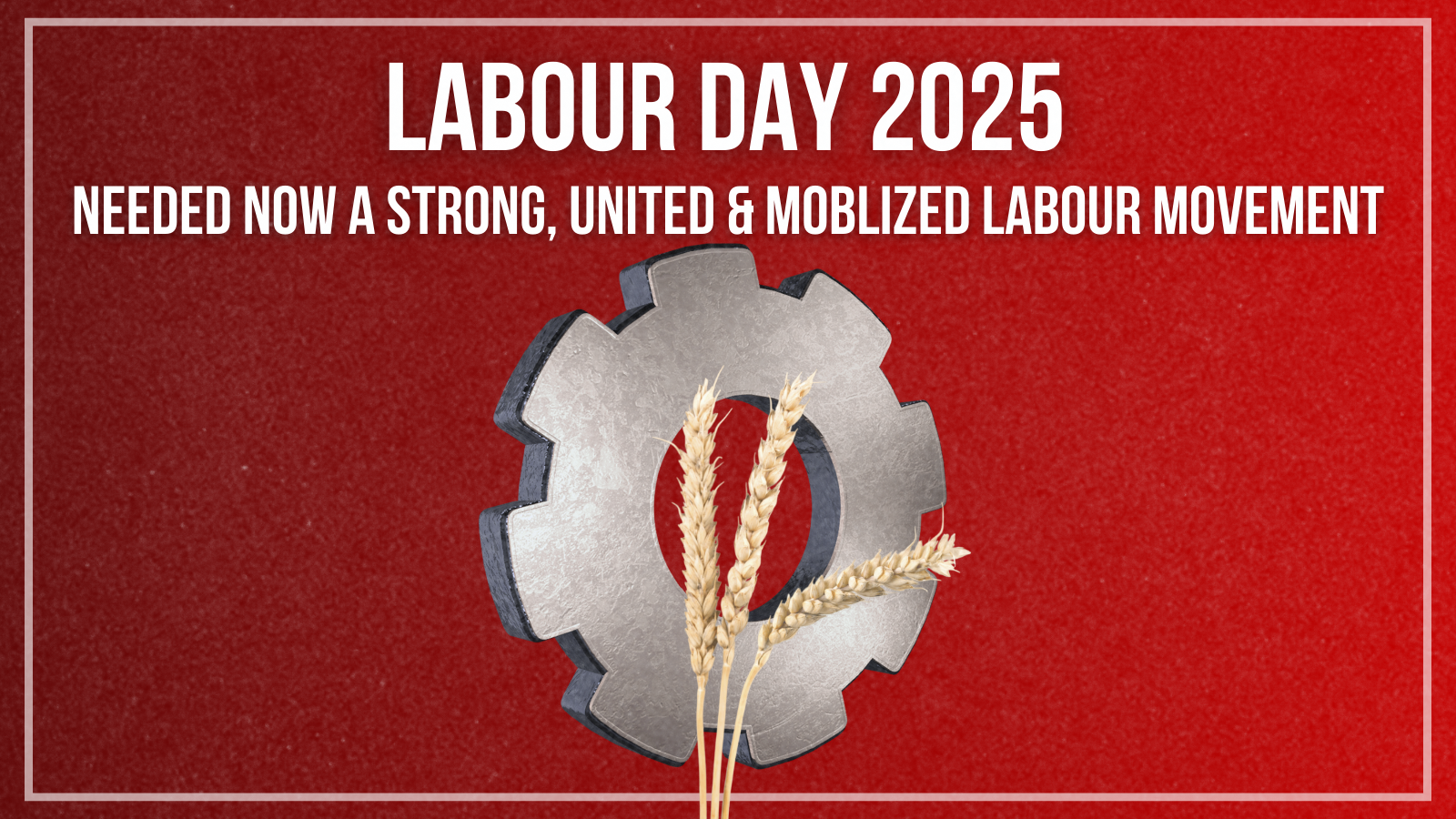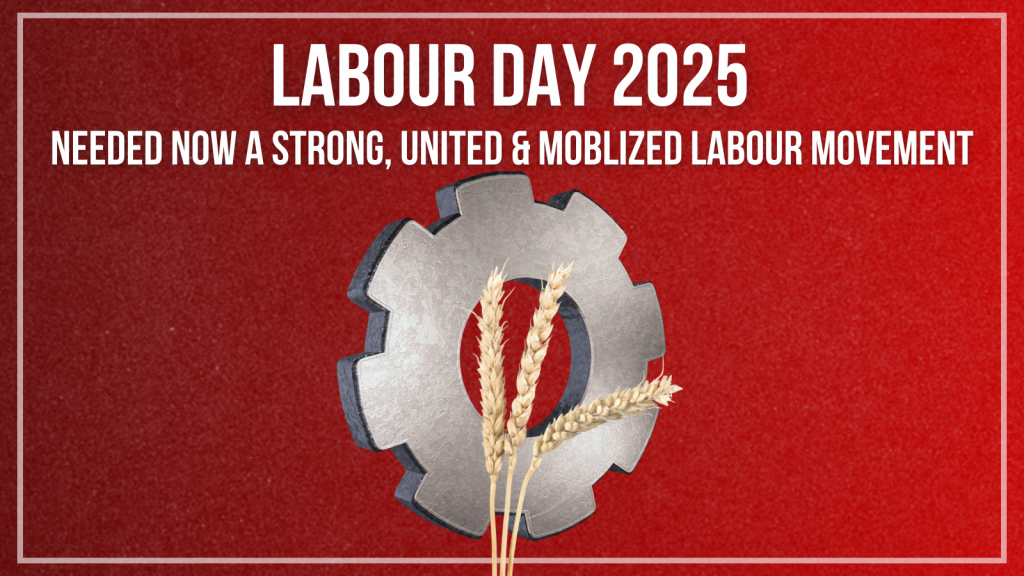Labour 2025: Needed now – a strong, united and mobilized trade union movement
The federal government’s latest intervention to stymie free collective bargaining took place just two weeks before Labour Day when striking Air Canada employees were ordered back to work, within hours of commencing job action.
The government’s defence was the same as it was when it intervened to block strikes in the rail industry, strikes of dock workers on the west coast and in Montreal, and postal workers across Canada: ‘Protecting the public interest’. But strike-breaking is strike breaking. If the government had any real interest in the “public interest”, it would have told employers to negotiate collective agreements instead of holding out until employer-friendly governments came to their rescue with back to work legislation. In the case of Air Canada, it would have passed legislation requiring employers to pay workers for all time worked, rather than fleecing them for an average of 35 hours of unpaid work each month.
Free collective bargaining is the public interest. And it’s the law in Canada, including the right to strike for all but essential workers. The fact that Air Canada and CUPE reached a tentative deal within hours of the union defying the back-to-work order shows that free collective bargaining works.
Liberals and the Conservatives have a history of restricting and negating those rights, in support of corporate power and profits. As former head of the Bank of Canada and then the Bank of England Liberal Prime Minister Mark Carney has lots of experience defending corporate profits and interests. His job has always been to protect the status quo utilizing economic levers such as interest rates to hold down workers’ wages and living standards while supporting back-to-work legislation on striking workers.
The right to strike is a fundamental right for unionized workers in Canada, as is the right to picket, and to organize and join a union. Almost a third of the workforce in Canada is unionized, and is growing as young workers and unorganized and laid-off workers seek the economic security and protections that unions provide. This is despite the never-ending efforts of corporations and right-wing governments to undermine and limit the power and the strength of the trade union movement in Canada. This includes the Conservative Party which claims to be a party for workers – “but not unions” – just like Trump in the US.
Organized labour in the US has shrunk to a density of just 8% of the workforce, leaving millions of workers unorganized and unprotected from unrestrained corporate power and greed, and fascist political movements and governments. This is the result of union busting legislation and campaigns combined with virulent anti-communism that broke the back of the AFL-CIO, and weakened the labour movement in Canada too.
International labour unity, solidarity, and collective action against transnational corporations, supra-national bodies like the World Bank, World Trade Organization, and trade agreements like CUSMA/NAFTA, is needed today more than ever. Workers around the world have common interests for good jobs, rising living standards, social programs, peace, democracy and development; but are increasingly facing off against global corporations whose only interest is profits and more profits. Elon Musk is a perfect example of what workers in the US and internationally are facing today. This includes military invasions and wars as transnational corporations fight for control of global resources and markets.
Trump’s war on the world is US imperialism’s response to China’s rapid advances in national and global economic development and trade which will soon eclipse the position of the US as the dominant economic power internationally. Major efforts have been made by the US, Canada, and other NATO countries to paint China as a political and economic threat though there is no evidence to back up the claim as the Hogue report showed.
The US, on the other hand, has done serious damage to the Canadian economy, to workers’ jobs and security, and the threats and damage keep escalating. It’s the US – with complicity of corporate monopolies and right-wing political movements here – that’s attacking Canada, and not only the economy, but also Canada’s sovereignty and independence. Trump’s threats are also fuelling the Alberta government’s drive to separate from Canada – and become the 51st state. Separatist sentiment is also being stoked by right-wing forces in Quebec whose interest is big profits, not national rights.
Trump’s tariffs have already cost tens of thousands of workers their jobs in the auto industry, in steel, and in aluminum, with more to come following Trump’s announcement August 1st raising across the board tariffs to 35%, with 50% tariffs on copper, steel, and aluminum, and with tariffs on lumber and dairy coming soon.
UNIFOR has warned that the tariffs on cars could lead to 20,000 autoworker layoffs in the city of Windsor alone, plus thousands more in Oshawa, Brampton, Oakville, St. Catharines, wherever US auto companies have assembly plants, and in the parts plants that feed them. Honda has decided not to build a plant in Canada because of the trade war, leaving hundreds of workers jobless. Other automobile companies are making similar decisions, including those making electric vehicles and the engines that make them work.
Prime Minister Carney’s response has been to make enormous concessions including elimination of the Digital Services Tax which would have generated an estimated $2 billion annually from US corporations alone. This and other corporate tax cuts could have been put into Medicare, or Employment Insurance, or social housing, or childcare, or pay and employment equity, or youth employment, or municipal services – the list is long. Instead of raising – and collecting – corporate taxes, the PM has bowed to Trump’s demand to increase military spending to 5% of GDP annually, to increase funding for NORAD, to spend $300 billion on new warships, and to join the US in its Golden Dome ‘continental defence’.
Carney has ordered 15% across-the-board cuts to social spending and public services to pay for increased military spending, and there will be more.
Now the PM and Parliament are orienting on renewing the Canada-US-Mexico free trade agreement (CUSMA), which is up for renewal in 2026. But it is this hemispheric agreement, first signed in 1988, that has caused so much grief for Canada and Mexico. Called out in 1988 as a “hemispheric corporate constitution”, these free trade agreements have dominated and subjugated Canada’s economy and foreign policy under US control.
Instead of expanding and deepening US control over Canada’s economy, foreign policy and trade, Canada needs to get out of CUSMA, get out of NATO, and assert its sovereignty and independence with a foreign policy of peace and disarmament, with a trade policy that’s multi-lateral and mutually beneficial, and with an economic policy that builds up the Canadian economy with a strong base in secondary industry and manufacturing, creating hundreds of thousands of well-paid, value added jobs in the process.
We need to nationalize the big auto operations in Canada – starting with the US Big Three – and build a Canadian car and a Canadian transportation industry that’s includes trains, planes, and ship-building. We also need to put the airline industry under public ownership and democratic control – starting with the renationalization of Air Canada – and repeal the Open Skies policy that has led to high prices, low wages, and greatly reduced transportation service within Canada. The PM’s drive towards further deregulation must also be stopped.
We need to nationalize the oil companies and move to renewable energy now, while there is still time. And instead of new pipelines that threaten the environment and trample on Indigenous rights and land, we need to build millions of units of affordable social housing, rebuild federal, provincial and municipal infrastructure, expand universal social programs and public services, and create permanent and well-paid jobs for today and for the future.
We need to invest in Medicare – including pharmacare and long-term care, and in public and post-secondary education, and in cities and municipal services. We need higher wages, incomes, and pensions, and better living standards for all.
Diverting massive military spending to civilian spending, and increasing and collecting current and deferred corporate taxes can provide the funds needed to do it.
These are the key issues facing labour on this Labour Day 2025. Independent labour political action led by a united trade union movement that includes the Canadian Labour Congress, UNIFOR and Quebec unions, and that works closely together with the democratic movements is the powerful force that holds the key to victory.
An injury to one is an injury to all.
Central Executive Committee, Communist Party of Canada


